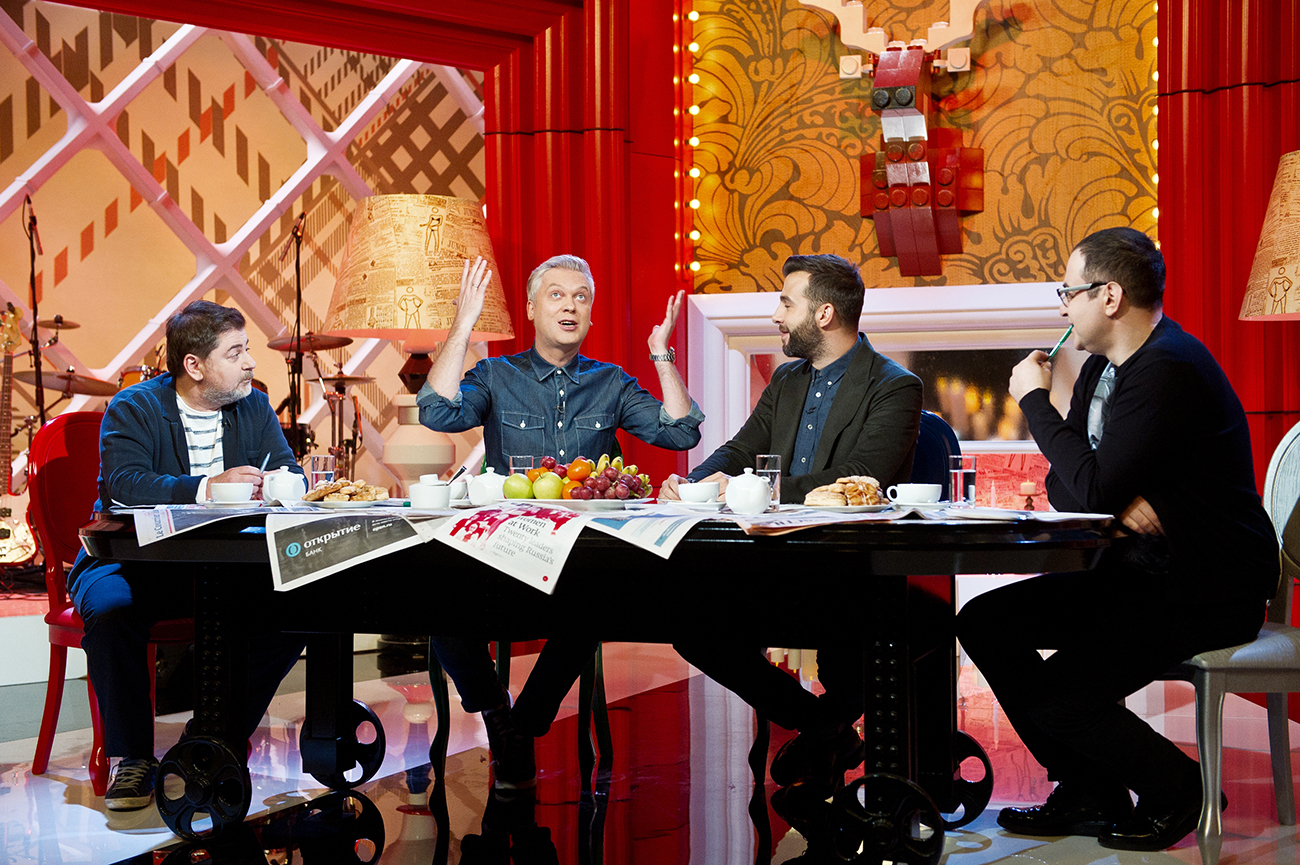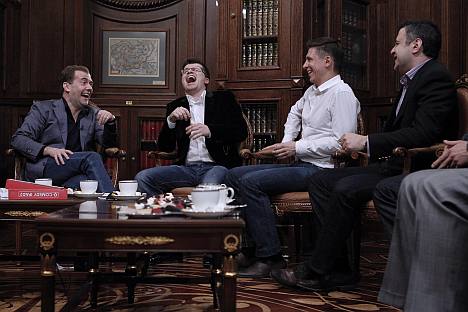Weapons of mass derision: Is Russian comedy the Kremlin's secret weapon?

TV hosts Alexander Tsekalo, Sergei Svetlakov, Ivan Urgant and Garik Martirosyan, from left, during the filming of Prozhektorparishilton program for Channel One.
Maxim Li/RIA NovostiNATO's Strategic Communications Center (StratCom) is sounding the alarm about the threat of Russian humor. On March 17 in Riga, Latvian specialists presented the report, "StratCom laughs: in search of an analytical network," that was the result of nine years of research.
The authors conducted a content analysis of four popular comedy programs on Russia's Channel One TV since 2008. Special focus was given to the Club of the Merry and Witty, also known by it's Russian initials, KVN, which is one of the oldest comedy shows on Russian television.
Discrediting Western leaders
StratCom specialists are especially concerned by the way evening comedy shows - Projector Paris Hilton, Evening Urgant, Yesterday Live, and Maxim Maxim - depict Western leaders. NATO analysts concluded that Russian TV comedians depict Western leaders in a negative light in order to discredit them. Russian TV devotes the most amount of time to American politicians.
"George Walker Bush has been portrayed in the most negative light – both personally and professionally, as a person of extremely low intelligence, hated by people all around the world," said the report. Among the Bush jokes is one where President Obama, when playing with White House employees' children, says that the first to urinate on the rug was George Walker Bush.
Speaking about French presidents, the analysts concluded that they were never portrayed as the leader of an influential western European state.
"We see two rather simple men (Nicolas Sarkozy and Francoise Hollande) who struggle to overcome the challenges of their everyday lives like any average person." The authors of the report were also displeased with the way German Chancellor Angela Merkel is presented. "Her role as one of the leading politicians of the European Union is almost completely ignored."
Gibberish
The report gave much attention to KVN, which has been on Russian TV for many years. A performance by Parapaparam, a team from the Moscow State Institute of International Relations, was taken as a case study. Analyzing the team's jokes, NATO concluded that the Kremlin uses KVN as "an instrument of strategic communications," by which the "regime" gains access to "strategically important" youngsters.
RBTH asked Ivan Abramov, captain of Parapaparam, to comment on these conclusions, and he called the analysts' evaluations "gibberish," disagreeing with their belief that KVN thrives thanks to "special relations with the Kremlin." Abramov linked KVN's success to an excellent sense of humor and its director, Alexander Maslyakov.
NATO's report will probably only generate more interest in the program. "After all this controversy people will start watching us with greater interest, and I fear to even think how many jokes will be created and performed by KVN members all over Russia," said Maslyakov.
Diabolical Russians?
A Channel One representative told RIA Novosti, "We read it and laughed."
KVN jury member and former player Yuly Gusman said, "brilliant people invented the program 56 years ago. It was supposed to be a weapon against NATO, and for all this time they've been honing it and now, thank God, it's perfect."
Another jury member, Valdis Pelsh, said he's happy about the Russian comedy TV program's popularity, and recommends NATO employees to "watch it with the whole family."
A member of KVN's Ural Pelmeni team, Andrei Rozhkov, said the report "looks like a fake; this is too much. I understand when there was the Komsomol, which prepared personnel for the Communist Party, but it's complete nonsense to say today that KVN is an ideological instrument."
The Russian Foreign Ministry also took note of the report. Ministry spokeswoman, Maria Zakharova, said, "humor has become a new challenge to peace. It's the new secret weapon in the arsenal of those insidious and diabolical Russians."
Read more: From spare chuckles to open mic: comedy in the city of rare smiles
If using any of Russia Beyond's content, partly or in full, always provide an active hyperlink to the original material.
Subscribe
to our newsletter!
Get the week's best stories straight to your inbox
